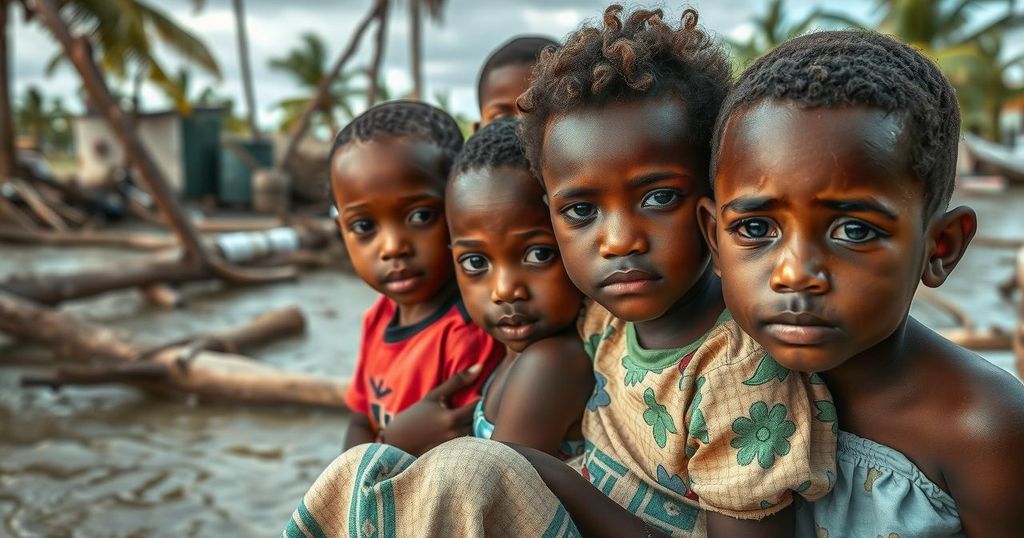Tropical Cyclone Chido has struck northern Mozambique, impacting approximately 90,000 children and displacing numerous families. The cyclone caused considerable destruction to homes and infrastructure, including classrooms and health facilities. Humanitarian efforts are underway, but many challenges remain, as authorities assess the situation and provide necessary aid.
Tropical Cyclone Chido recently ravaged northern Mozambique, leading to substantial humanitarian crises. Striking near the city of Pemba in Cabo Delgado province, the cyclone unleashed torrential rains and violent winds, destroying approximately 35,000 homes and displacing countless families. As reported by the UN Children’s Fund (UNICEF), the storm has severely impacted around 90,000 children; the total number of affected individuals may rise as assessments continue.
The cyclone’s destruction extends beyond housing; classrooms and health facilities have also suffered. At least 186,000 classrooms were rendered uninhabitable, alongside 20 health facilities. UNICEF’s representative in Mozambique, Mary Louise Eagleton, highlighted that children in the nation were already facing emergencies caused by conflict, drought, and disease outbreaks prior to this latest disaster.
In addition to the devastating impact in Cabo Delgado, Cyclone Chido also affected regions in Nampula and Niassa provinces, leaving upwards of 25,000 families without electricity and damaging vital water infrastructure. As Mozambique grapples with a cholera outbreak, the recent destruction poses a serious threat to public health. The World Health Organization (WHO) has deployed experts to assess health needs and aid response efforts.
The UN Refugee Agency (UNHCR) has mobilized swift humanitarian assistance. Initial relief efforts have provided vital supplies to over 2,600 individuals affected in Pemba within the first 48 hours after the storm. Eujin Byun from UNHCR noted, “preliminary assessments suggest that around 190,000 people urgently need humanitarian assistance.” It appears that many rural areas have experienced extreme damage, with nearly 10,000 homes destroyed and 33 schools affected.
The UN Secretary-General, António Guterres, has affirmed that UN teams are facilitating emergency aid and remain poised to enhance support as required. Following the cyclone, the Office for the Coordination of Humanitarian Affairs (OCHA) reported challenges in accessing supplies, resulting in a $4 million allocation to support early response efforts. In light of projections indicating that approximately 3.3 million people in Mozambique may face critical food insecurity next year, the World Food Programme (WFP) is increasing its support for the most affected population.
Cyclone Chido has highlighted the vulnerability of Mozambique to climatic disasters. Situated in a region experiencing significant environmental changes driven by climate change, Mozambique faces recurring emergencies, including conflicts and health crises. The cyclones often exacerbate existing humanitarian conditions, revealing the precarious situation of communities already threatened by food insecurity, illness, and displacement. This incident emphasizes the urgent need for coordinated international assistance to mitigate the adverse impacts of natural disasters in such vulnerable areas.
In summary, Cyclone Chido has created a humanitarian disaster in Mozambique, particularly affecting children and vulnerable communities. With significant loss of housing, educational facilities, and healthcare systems, the long-term repercussions of this storm could be dire. The response from various UN agencies and humanitarian organizations is critical, but challenges in resource access and ongoing health crises necessitate urgent and continued support to the affected populations.
Original Source: news.un.org






